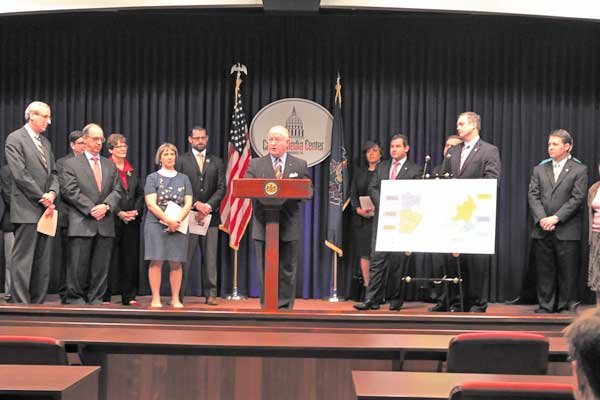Legislation to ban LGBT discrimination statewide was reintroduced into the House and Senate this week, and backers are optimistic that the long-stalled effort could see some progress this session.
In a press conference Tuesday morning in Harrisburg, a coalition of lawmakers, activists and corporate partners unveiled HB and SB 300, introduced that day with unprecedented support.
The House version is being led by Reps. Dan Frankel (D-23rd Dist.) and Chris Ross (R-158th Dist.), while the Senate bill is spearheaded by Sens. Larry Farnese (D-First Dist.) and Pat Browne (R-16th Dist.). This marks the first time that the legislation is being taken up by bipartisan co-prime sponsors. It is also the first time both pieces of legislation will carry the same bill number.
The House version was introduced with 77 cosponsors, including seven Republicans. The Senate bill has 25 cosponsors, including two Republicans.
Last session, the House bill had 65 cosponsors, while Browne’s version of the Senate measure had 13 cosponsors and Farnese’s had nine.
Frankel said he anticipated the legislation could have a tough time in the House but Farnese was unequivocal about its chances in the Senate: “We’re confident if this comes up for a vote, it will pass. To be clear, it will pass the Senate.”
Frankel added that the broad, bipartisan cosponsorship marks a new phase for the legislation.
“We’re standing together today in support of basic fairness, to say that someone cannot be fired from a job or denied a rental property just because of his or her sexual orientation or gender identity,” Frankel said. “Today marks a significant step towards LGBT equality in Pennsylvania, and it’s my hope that the coalition of support here today will build genuine momentum for a breakthrough in the state legislature. The climate is still difficult; LGBT progress lags behind in Pennsylvania at an alarming rate. But I’m joined by colleagues, friends and advocates who believe that, with these bills, there is a chance to effect real change for LGBT people in Pennsylvania.”
The legislation would amend the Human Relations Ordinance to add sexual orientation and gender identity to the classes protected from discrimination in employment, public accommodations and housing.
During the press conference, Farnese tore up a lease agreement to demonstrate that LGBTs in most parts of the state can be denied housing because of their sexual orientation or gender identity.
“It is outrageous in 2013 that someone can be denied or lose a place to live or lose a career of their choosing simply because of their sexual orientation, gender identity or gender expression,” Farnese said. “This is wrong and we are here today to do something about it. This is common sense and long, long overdue. We have an opportunity to do the right thing — to cast a vote, not because of special interests knocking at our door or because of who we know but because, damnit, it’s the right thing to do.”
More than two-dozen lawmakers were on hand for the press conference, which out Rep. Brian Sims (D-182nd Dist.) called the largest gathering of pro-LGBT state legislators in Pennsylvania’s history.
“On days like today, the equality advocates, activists and warriors I am joined by show the American spirit. And American values demand that we as a commonwealth finally evolve,” Sims said. “Our neighbors in nearly every direction have moved beyond us and are surpassing us, and it is long past time to stand up and say, ‘Enough is enough.’ Pennsylvania citizens demand equality. Pennsylvania businesses demand equality Our constitution demands equality.”
Equality Advocates executive director Ted Martin noted that all of the Fortune 500 companies based in Pennsylvania have enacted LGBT nondiscrimination protections.
Martin also unveiled results of a new poll from the Susquehanna Polling and Research, conducted in March, that found that 72 percent of Pennsylvanians support nondiscrimination protections for LGBTs. Martin noted that support came from 85 percent of Independents, 73 percent of Democrats and 67 percent of Republicans.
Ross noted that lawmakers on both sides of the aisle should take note of the growing bipartisan support.
“Defending against LGBT discrimination is not a Democratic issue or a Republican issue, or a House issue or a Senate issue — it’s a human issue,” Ross said. “All Pennsylvanians deserved to be treated with human dignity, it’s really that simple. And the public at large gets that.”
Browne added that the measures don’t, as some opponents have argued, seek special treatment for LGBT Pennsylvanians.
“It’s not about special rights or preferential treatment,” he said. “It’s simply about every Pennsylvanian having the same protection from discrimination — regardless of sexual orientation or gender identity. Here is where William Penn began his Great Experiment of tolerance, and we don’t stand as leaders right now.”
Twenty-one states and Washington, D.C., have adopted similar legislation, and Pennsylvania is the only state in the Northeast without LGBT-specific nondiscrimination protections.
Joining the lawmakers were a gay Erie man who was fired from his job after speaking out against antigay harassment he faced, representatives of the Service Employees International Union and the Pennsylvania Council of Churches, and a former Susquehanna Township commissioner who was integral in passing that township’s LGBT nondiscrimination ordinance.
Candi Castleberry-Singleton, chief inclusion and diversity officer at the University of Pittsburgh Medical Center, one of the state’s largest employers, spoke about UPMC’s own diversity initiatives, including its nondiscrimination policy and domestic-partner benefits.
“We have to support our words with actions and, as employers and leaders, we can choose to support inclusion through local ordinances and things like HB 300,” she said. “We can accomplish much more when we work together, so let’s do just that. Together we can inspire a culture of collaboration in the places we live and work, all based on the simple idea that inclusion matters to all of us every day.”
